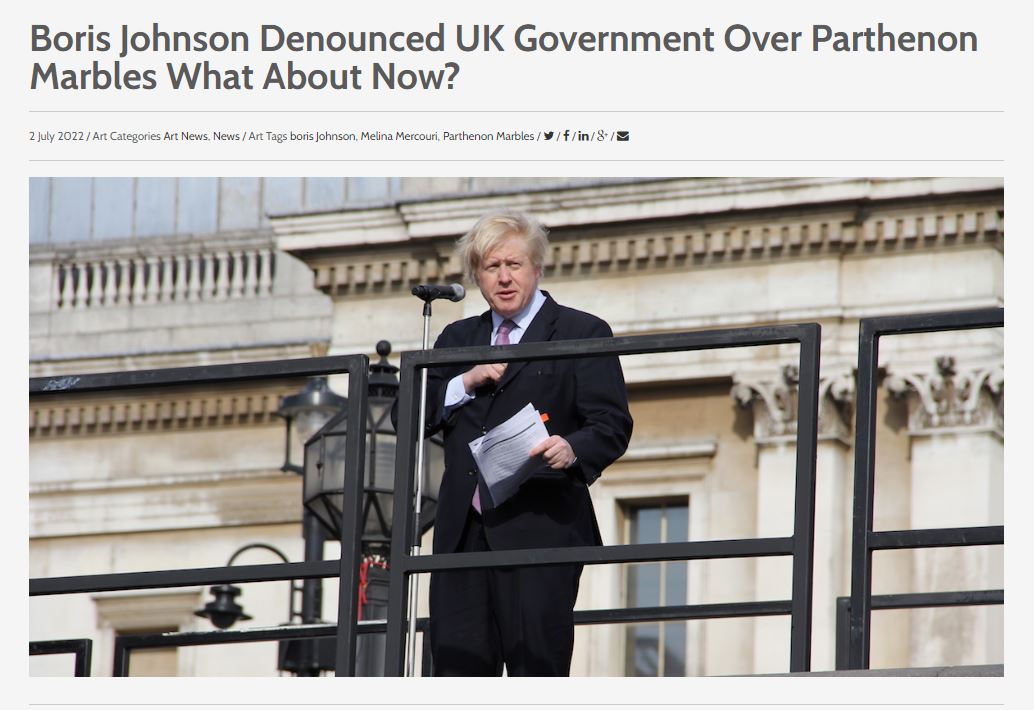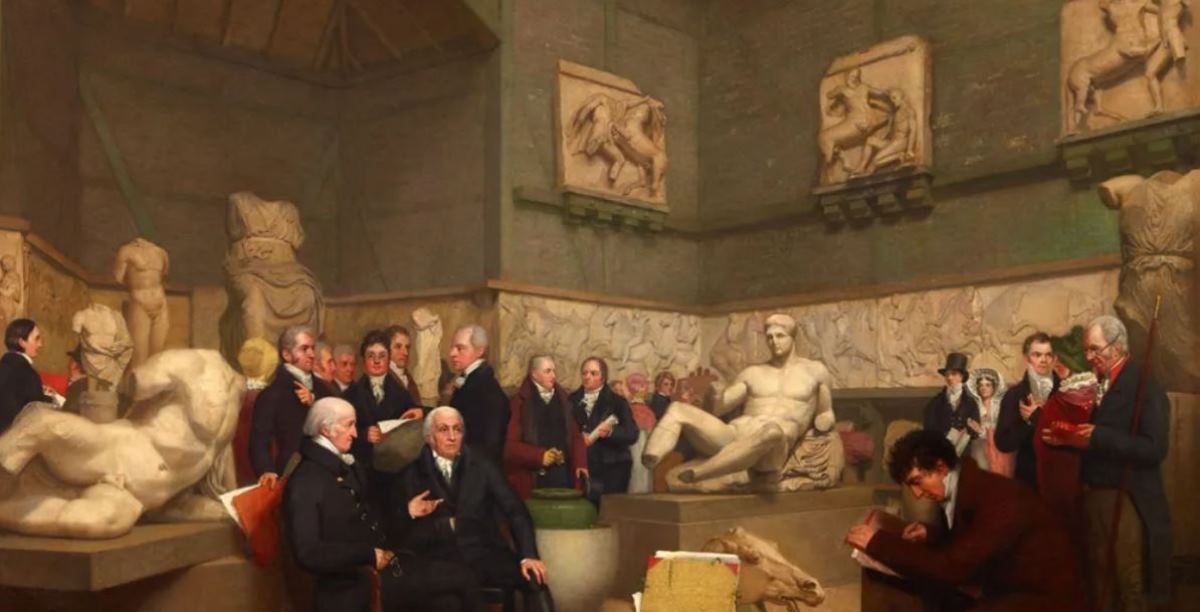Johnson's contradictions on the reunification of the Parthenon Marbles causes reactions.
The British media, politicians, academics and campaigners welcomed the revelation in Ta Nea about the letters from 1986 of the current Prime Minister, which are in favour for the return of the Parthenon Marbles to Greece. Report by Yannis Andritsopoulos, UK Correspondent for Ta Nea in today's edition of the paper, Monday 04 July 2022.
Reactions in Britain after the revelation by Ta Nea's weekend news of the letters that Boris Johnson wrote to the then Greek Minister of Culture Melina Mercouri, in 1986. The letters declared Johnson's support for Greece's request for the reunification of the Parthenon Sculptures. Written between March and April 1986, by the then 22-year-old President of the Oxford Union, the letters denounced the 'scandalous' attitude of the British government and admitted that Lord Elgin extracted the ancient Greek artifacts without permission.
Leading British media reported extensively on the issue, while British politicians and academics spoke to Ta Nea, and pointed out the 'hypocrisy' of the British Prime Minister. The Observer article witten by Helena Smith, Sunday 03 July, quotes Johnson's letters:
“If the motion was successful, and I am sure that it would be, it would be a clear message to the British government that their policy is unacceptable to cultured people,” he wrote on 10 March 1986, inviting the actor turned politician to address the union in June that year.
“I think the majority of students agree with me when I say there is absolutely no reason why the Elgin marbles, superlatively the most important and beautiful treasures left to us by the ancient world, should not be returned immediately from the British Museum to their rightful home in Athens.”
And Helena Smith goes on to add:
Johnson has always acknowledged the significance to Greece of carvings regarded as the high point of classical art. But in the ensuing years, his tune would change dramatically. Both as London’s mayor and prime minister he has echoed the long-standing position of successive British governments that the antiquities “were legally acquired by Lord Elgin under the appropriate laws of the time”.
The Sunday Telegraph heads up its report: "Boris Johnson denounced Government for not returning Elgin Marbles, 1986 letters reveal" and points to the contradiction in Johnson's stance then and now. "Only last year he categorically rejected any talks on the return of the ancient marbles to Greece, insisting that they will remain in Britain because they have been legally acquired. However, in letters published by the Greek newspaper Ta Nea, Boris Johnson passionately supported the return of the Marbles, accusing Lord Elgin of widespread looting."
In his Telegraph report, Patrick Sawer points out that Johnson "unreservedly sided with the Greek government's campaign for the reunification of the marbles" and adds that "supporters of the return of the Marbles have stated that the disclosure of the letters will put pressure on the British government to conclude an agreement with Athens." The publication states that if Britain gave back the Sculptures, Greece would in return, among other things, lend the golden mask of Agamemnon found in the royal tombs of Mycenae and the bronze statue of Zeus of Artemision.
The Artlys also carried the Ta Nea article , and with the heading: 'Boris Johnson Denounced UK Government Over Parthenon Marbles. What About Now?'.
On April 16, 1986, Johnson sent a second letter to the Greek culture minister, insisting that “the issue of the Elgin Marbles (…) has been handled with sophistry and intransigence by the British government”.
“Since the discovery of Elgin’s letter of 1811, the Government’s position has grown even shakier,” he stressed.
Lord Elgin had previously received a letter from the former British Ambassador to Constantinople, Robert Adair, which suggested that Elgin had not acquired the marbles legitimately. A 2002 BBC News report noted that Adair’s letter “could help resolve the row between Britain and Greece over the Elgin Marbles.”
In today's Ta Nea, statements including Baroness Shami Chakrabarti, a current member of the House of Lords, and BCRPM member: “Boris Johnson’s legendary shape-shifting has been at the expense of Greece, the United Kingdom and so many people in his personal and public lives. The elite student politician courted the Greek Embassy with his efforts to return the Parthenon Marbles to Athens, just as the candidate for London Mayor once championed justice, rights and freedoms. As Prime Minister he has torn up his promises to Greece and proposes to tear up the UK’s Human Rights Act for good measure.”

"Moralism is cheap. Things really change when you're in power. That's where you show if what you claimed was right, you also put into practice," John Tasioulas, professor of Ethics and Law at Oxford University, and a BCRPM member, told Ta Nea.

Janet Suzman as Chair of BCRPM also sent a statement to Ta Nea: "thanks to Ta Nea, we were thrilled to read how strongly Johnson once condemned the theft of these sculptures. Today, our Prime Minister changes his mind when it suits him, and seems to have forgotten the youthful anger he felt over the injury caused to the Parthenon by Elgin. At the same time, we welcomed the article in the Times and statements on the BBC made by Tristram Hunt, director of the Victoria and Albert Museum, that British museum law must be changed to ensure that museums can decide for themselves whether to return stolen items to their countries of origin. This is the most important statement made to date by the director of a London British museum, which must have consequences," Suzman concludes, referring to the reunification of the Parthenon Marbles.

,







Comments powered by CComment